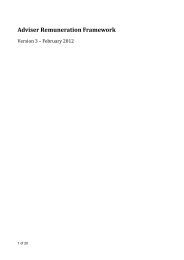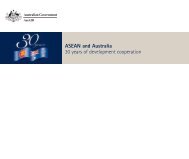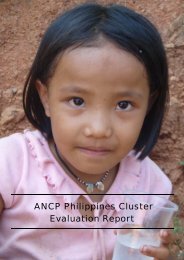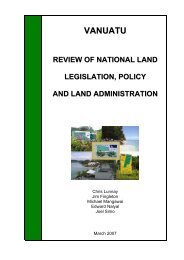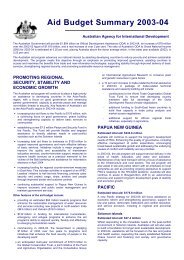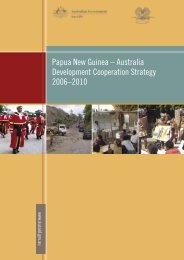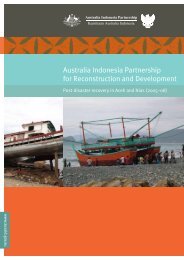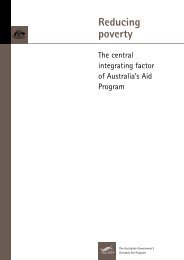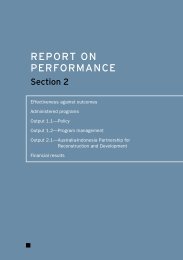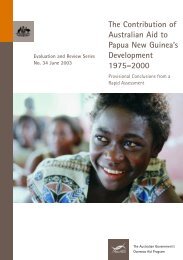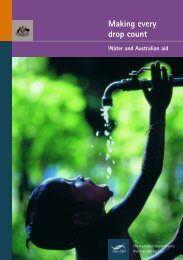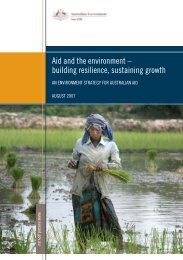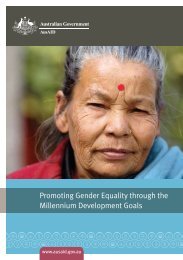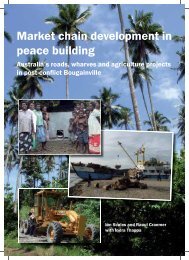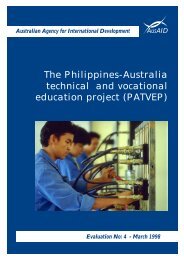CDC 132, 15 March 2012 [PDF 50kb] - AusAID
CDC 132, 15 March 2012 [PDF 50kb] - AusAID
CDC 132, 15 March 2012 [PDF 50kb] - AusAID
Create successful ePaper yourself
Turn your PDF publications into a flip-book with our unique Google optimized e-Paper software.
<strong>AusAID</strong> / NGO<br />
Committee for Development Cooperation<br />
A Joint Committee of the Australian Agency for International Development and<br />
Australian Non-Government Organisations<br />
Draft Minutes of the <strong>132</strong> nd <strong>CDC</strong> Meeting held on <strong>15</strong> <strong>March</strong> <strong>2012</strong><br />
Attendees<br />
<strong>AusAID</strong><br />
Mr Gary Powell, ADG NBB (Chair)<br />
Mr Timothy Church (Legal Adviser)<br />
Mr Russell Miles (Director NGO Policy, Partnerships and Program Section)<br />
Mr Simon Cann-Evans (Director Mining for Development)<br />
NGO Representatives<br />
Mr Andrew Newmarch (World Vision)<br />
Rev John Deane (ABM)<br />
Ms Bridgette Thorold (Oxfam)<br />
Apologies<br />
Mr Adam Laidlaw (WaterAid)<br />
Ms Zoe Mander-Jones (<strong>AusAID</strong>)<br />
Secretariat<br />
Ms Ruth Megirian (<strong>AusAID</strong>)<br />
Ms Katharina Dollmann (<strong>AusAID</strong>)<br />
Chris Wark (ACFID)<br />
Observers<br />
Ms Christina Nguyen (<strong>AusAID</strong>)<br />
Susan Harris Rimmer (ACFID)<br />
Welcome and Introductions<br />
The Chair introduced himself and welcomed other new members to the <strong>CDC</strong>.<br />
The meeting noted that Tim Church was an out-going member of the <strong>CDC</strong>, but that no<br />
date had been set for his departure.<br />
The meeting welcomed Simon Cann-Evans as a new member of the <strong>CDC</strong>.<br />
1
The meeting also welcomed Chris Wark who has taken over the role previously held by<br />
Alex Oates as the <strong>CDC</strong> liaison point for NGO representatives in the <strong>CDC</strong>.<br />
The Chair made the following opening remarks:<br />
• <strong>AusAID</strong> has been restructuring to better position the organisation to manage the<br />
increasing aid program. The restructure has been largely completed, although<br />
some positions remain to be filled. NGO & Business Branch (NBB) reports to a<br />
new First Assistant Director General, Margaret McKinnon in Africa and<br />
Community Programs Division, reporting to James Batley, Deputy Director<br />
General, Country Programs Group.<br />
• The Chair acknowledged the leadership and contribution of the former Chair,<br />
Therese Mills, who has taken up the position of ADG Scholarships and<br />
Volunteers Branch, also in the Africa and Community Programs Division.<br />
1. The meeting accepted the Minutes of the <strong>CDC</strong> Meeting 131 subject to including<br />
Jason Alferink as an observer.<br />
2. Action log<br />
The meeting agreed that items should be removed from the Action Log where they<br />
have been completed. Other items should be removed because they will be<br />
addressed through implementation of the Civil Society Engagement Framework for<br />
discussion later in the agenda.<br />
The following item remains on the action log:<br />
• Revision of the NGO Head Agreement.<br />
Although the development of good practice guidelines for working with NGOs is no<br />
longer an action item for the <strong>CDC</strong>, the issue of developing such guidelines may<br />
come back to the <strong>CDC</strong> in the context of implementing action items in the CSEF. In<br />
this respect, the Chair advised that <strong>AusAID</strong> is in the process of appointing a steering<br />
committee to oversee implementation of the CSEF. The prupose of good practice<br />
guidelines is to ensure consistency across Australia’s aid program on working with<br />
civil society organisations.<br />
3. Draft Civil Society Engagement Framework (CSEF)<br />
The Chair acknowledged that consultation with the <strong>CDC</strong> had been delayed until after<br />
<strong>AusAID</strong>’s consultation with ExCom on 7 <strong>March</strong> and that <strong>AusAID</strong> had not had<br />
sufficient time to incorporate ExCom’s comments prior to the <strong>CDC</strong> meeting. ACFID<br />
2
was able to distribute ExCom’s comments to <strong>CDC</strong> members on the evening prior to<br />
this <strong>CDC</strong> meeting.<br />
It is expected that the CSEF will be launched in the next few months. It provides<br />
guidance to how <strong>AusAID</strong> will engage with civil society organisations across the aid<br />
program to address poverty up to 20<strong>15</strong>. The meeting noted that a strong civil<br />
society is also a development outcome in its own right.<br />
Russell Miles provided an overview of how ExCom’s comments and concerns would<br />
be incorporated into the next iteration of the draft CSEF and sought input from the<br />
meeting particularly in relation to the proposed ‘Intended Actions’.<br />
The meeting noted that both Code of Conduct and the accreditation process remain<br />
relevant to <strong>AusAID</strong>’s risk management practices in engaging with Australian CSOs.<br />
NGO members sought further information as to how <strong>AusAID</strong> conducts risk<br />
assessments of non-accredited NGOs (Australian, local and international), given the<br />
level of funding that non-accredited NGOs receive from <strong>AusAID</strong>.<br />
NGO members also noted that while accreditation is a risk management tool for<br />
<strong>AusAID</strong>, recognised development expenditure (RDE) is used both for allocating<br />
ANCP funds and as an indicator of independence from government. The draft<br />
CSEF places greater emphasis on performance and less on RDE as the basis for<br />
decisions on allocating funding. NGO members of the <strong>CDC</strong> sought to understand<br />
the impact of a changed allocation model on the future of ANCP grant funds, and<br />
discussed the merits of a ‘traffic light’ system as is currently used in <strong>AusAID</strong>’s QAIs.<br />
The Chair reminded the meeting that no discussions or decisions had yet taken<br />
place in respect of allocation models, and no timetable had yet been set for this work<br />
to be undertaken.<br />
NGO members suggested that some proposed action items on the draft CSEF were<br />
currently not well-aligned with objectives. They also suggested that a greater focus<br />
on ‘research’ as an action item could add greatly to how civil society is understood<br />
as both a contributor to the development of civil societies as well as a contributor to<br />
poverty reduction. The meeting also cautioned <strong>AusAID</strong> about unintended<br />
consequences in relation to Objective 3 – Reduced risks and shared accountability.<br />
4. Outsourcing of the Administration of Accreditation and Overseas Aid Gift<br />
Deduction Scheme (OAGDS) Assessments<br />
Ruth Megirian spoke to the paper provided to <strong>CDC</strong> members and provided an<br />
overview of the rationale and history for outsourcing the administrative process for<br />
accreditation and OAGDS and <strong>AusAID</strong>’s proposed approach to meeting future<br />
demand.<br />
3
NGO members raised concerns about the extent of the concept of outsourcing and<br />
the need to ensure that the integrity of assessment was not compromised. <strong>AusAID</strong><br />
indicated the proposed tender had been originally discussed last year and put on the<br />
<strong>AusAID</strong>’s Annual Procurement Plan on AusTender.<br />
<strong>CDC</strong> members also sought greater clarity about the proposed role of the <strong>CDC</strong> if<br />
<strong>AusAID</strong> were to outsource accreditation (and OAGDS assessments) to an external<br />
provider and how any concerns regarding the process would be managed with a<br />
provider.<br />
It was agreed that <strong>AusAID</strong> would provide more detail and clarity regarding the scope<br />
of activities proposed to be outsourced at the next <strong>CDC</strong> meeting. It was suggested<br />
that a communications strategy will need to be prepared to explain what any<br />
proposed outsourcing of the administration of OAGDS and accreditation<br />
assessments covers.<br />
Action Item: <strong>AusAID</strong> to prepare a paper for the <strong>CDC</strong> on the extent of the<br />
outsourcing proposed (including what it does and does not include) the role of the<br />
<strong>CDC</strong> in relation to the accreditation process and management, taking into<br />
consideration the implementation of the Civil Society Engagement Framework.<br />
5. Organisational Reports<br />
For individual applications, see Annex A.<br />
The <strong>CDC</strong> noted the accreditation schedule and the large number of new applications<br />
and re-accreditations scheduled this year. <strong>CDC</strong> members agreed to review OR<br />
reports out of session if required.<br />
6. Other Business<br />
• The Chair advised that declarations of any conflicts of interest would be a<br />
standing agenda item for all future <strong>CDC</strong> meetings.<br />
• The <strong>AusAID</strong> Secretariat will instigate a system of purchase orders to clarify<br />
<strong>AusAID</strong>’s policies on reimbursement to <strong>CDC</strong> for NGO members to attend<br />
<strong>CDC</strong> meetings and simplify <strong>AusAID</strong>’s budgeting, invoicing and payment.<br />
• <strong>CDC</strong> meeting dates for <strong>2012</strong> have been revised to:<br />
23rd May<br />
22nd August<br />
21st November<br />
4


![CDC 132, 15 March 2012 [PDF 50kb] - AusAID](https://img.yumpu.com/24383144/1/500x640/cdc-132-15-march-2012-pdf-50kb-ausaid.jpg)
